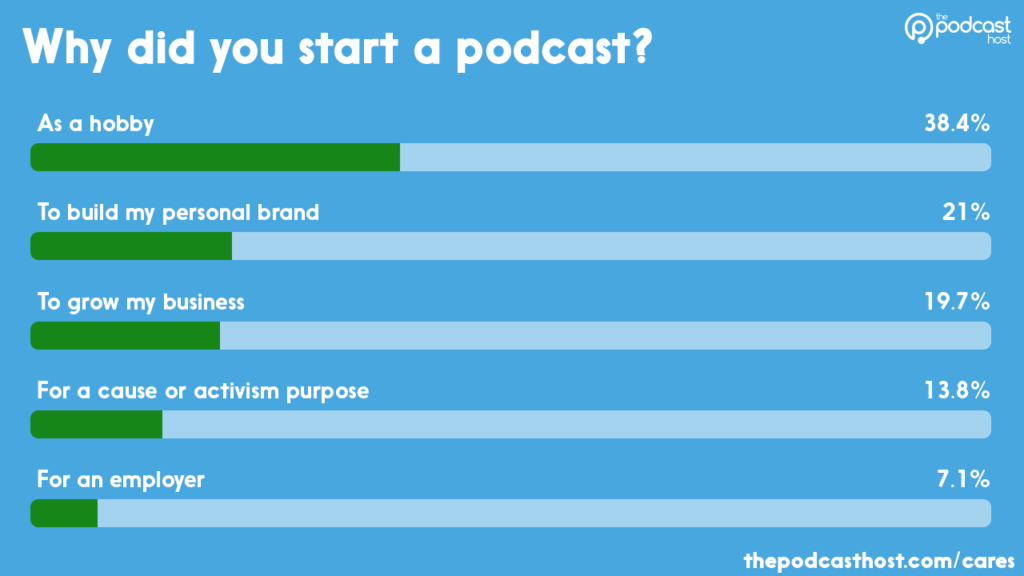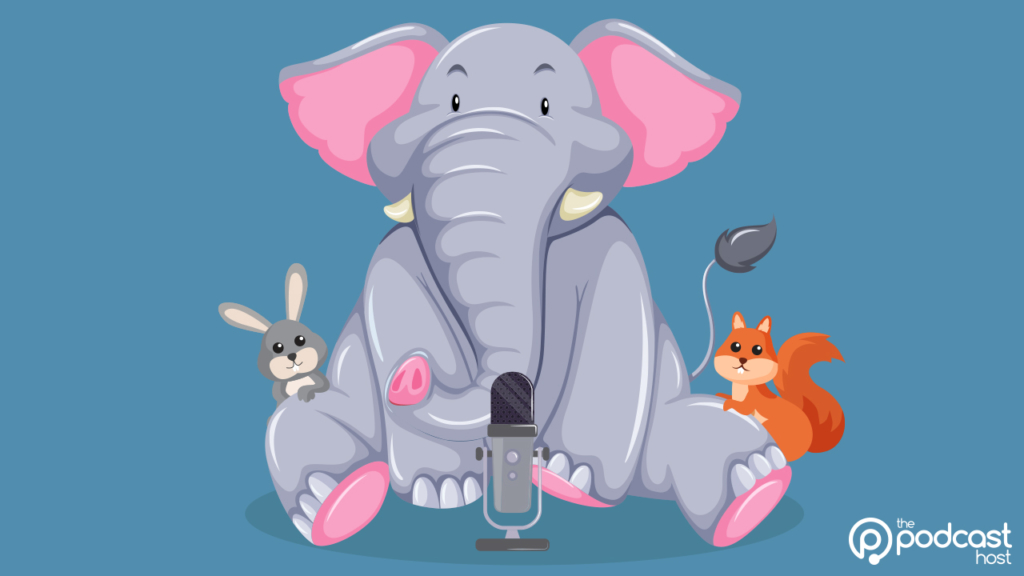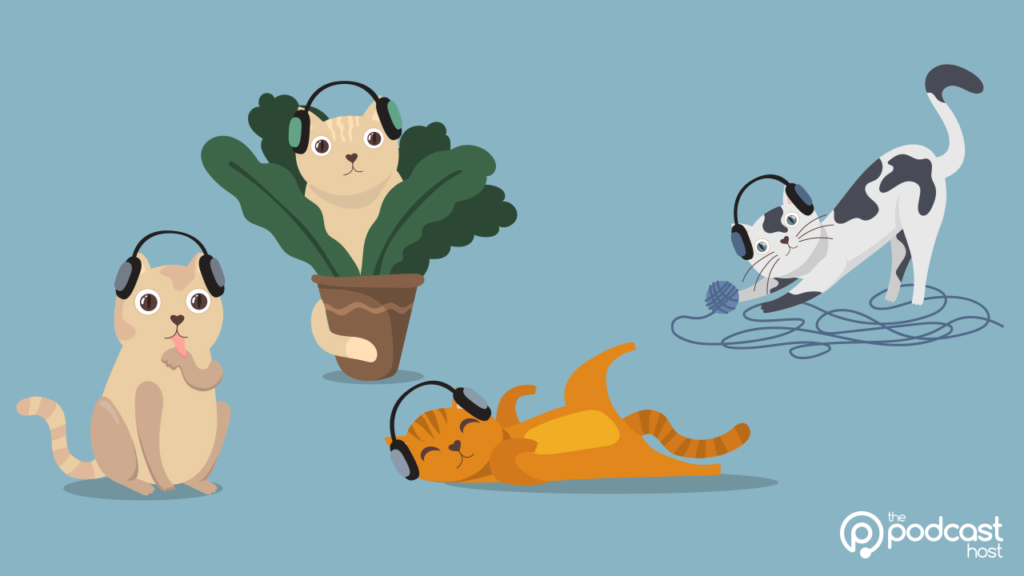When Your Podcasting Is Not a Hobby, What Is it?

In our recent Podcaster Cares survey, we asked people why they started podcasting, in a multiple-choice format. The majority (over 38%) picked “as a hobby.” Some people sent us feedback saying, “the kind of podcasting I do doesn’t fit this survey because I do this for creative expression.” So, let’s examine this. When your podcast doesn’t fit a standardized business model, but your podcasting is not a hobby, what is it? What potential does it have? And, how are its needs different?

Pack a lunch and buckle your seatbelts. This is a topic I feel strongly about, it’s multi-faceted, and I promise you there is a point. But it’s going to take a while to get there.
Define “Hobby.”
The first time someone described my podcast as a hobby, I was furious. My tax preparer examined all my receipts from my first podcast, and she said, “Okay, so… this is a hobby.” I saw red, and she changed the subject very quickly. Her point was that for tax purposes if something costs more to do than it brings in, it’s a hobby. I could have told her about the huge businesses that don’t turn a profit for years either, but I kept my mouth shut.
A hobby is something you do for fun and/or personal growth. It doesn’t require a responsibility to others, and it’s not time-sensitive. When it stops being fun, you can stop doing it.
Hobbies are very good for people in general. They can pay off in:
- Improved cognitive function and memory
- Social connections
- Improved physical agility
- A “flow” state
- Enhanced patience and emotional flexibility
Podcasting can be a hobby. The practice of recording, editing, and publishing has challenges that can feel fulfilling. It’s fun.
But, a podcast is meant for an audience. Otherwise, you’d simply record your episodes and keep them for your own enjoyment. Distributing your work consistently, and working on improvement and growth, require a certain amount of responsibility to outside forces.
When you keep going when it’s no longer fun and find new ways for you and your audience to engage with the content, out of a sense of responsibility and a need for long-term growth, it’s not a hobby.
I knit as a hobby. When I don’t feel like doing it, I don’t. When I make a podcast, I’m responsible to my collaborators, my audience, and the story I’m trying to share (whether fiction or nonfiction).
Define: “Not a Hobby,” or a “Serious” Podcast.
Many people feel that because some podcasters make money, if they produce a similar show, they will also make money. Now we have zillions of podcasts based on the talk-show model. These are comparatively simple to monetize; audiences are used to shows punctuated by advertising. Defining a unique value proposition is more clear-cut in a talk show format. It’s easy to explain.
As a result, many podcast “experts” and “gurus” recommend similar models. Most podcasting advice, discourse, tools and strategies support podcasters who adhere to the show format of opinions punctuated by advertising.
The models for what makes a “successful podcast” are often tied to numbers because those are easy to quantify. We can talk about download numbers or ad sales dollars.
It’s like we’re all trying to please our dad, who told us to “quit screwing around with this creative stuff and go get a real job.” If we can just get the numbers, we can prove we’re not wasting our time and energy! Right?

What If My Podcast Doesn’t Fit The Mold?
A lot of people come to podcasting because they have creative skills from other media (music, film, theatre, fiction, sound design, etc.) and want to experiment with the podcasting medium. Often, these podcasts don’t conform to a commercial format. They can be harder to monetize. Advertising can interrupt the podcast episode’s flow of information and distract the listener. They’re also an acquired taste. Establishing the podcast’s uniqueness is easy. Carving your niche and finding your audience can take longer.
Many podcasters are committed enough to their topic that this goes way beyond a hobby. But, their podcast doesn’t match the formula for what sponsors call a “serious” podcast. So, the usual models that monetize and sustain most podcasts won’t help.
Creative Endeavour Podcasting
Much of the strongest and most exciting podcasting is happening way outside the talk-show model.
For example, James T. Green’s U+1F60C is “an audio zine, scraps of documentary that isn’t allergic to rhythm.” Each episode is an immersive audio experience, using storytelling, documentary, music, sound effects and editing experiments to make a wholly immersive and emotionally affecting experience.
This show bears a lot of the hallmarks of a “hobby.” Each episode is emotionally affecting and intricately crafted, shining a flashlight around the uncomfortable parts of the human experience. I’d never call this podcast a hobby, though. Nothing about this podcast is easy. It’s a creative endeavour. Green calls his audio constellations a “muxture.”
I make a podcast called ADWIT, The Audio Drama Writers’ Information Toolkit. Originally, we intended to help people make better audio drama podcasts. We followed the chat-show format for the first few episodes, hoping to monetize with sponsorship and promote with trailer swaps. But we couldn’t show how audio drama works without writing and producing it in an audio drama style. The best way to engage with the material was to make it an audio drama about how to write an audio drama.
Is there a category for this in Apple Podcasts? No. Can I submit this show to the Apollo app? Technically, no, I think. Promoting this neither-fish-nor-fowl podcast is challenging.
When your podcasting is not a hobby but a creative endeavour, your show has different challenges to grow audiences and sustain production.
Growing and Sustaining the Creative Endeavour Podcast
What if success wasn’t defined by chart placement, number of advertisers, or sponsorships?
What if success could be defined by things like:
- Reviews and testimonials
- Live shows of podcast recording sessions
- Comissions, partnerships and collaborations
- Crowdfunding, bonus content, and patronage
- Cross-media content, such as books, visual art, and more
Again, look at James T. Green. He hasn’t relied on ads or sponsorships. Instead, he’s used his podcast to connect with other creative folks in radio, podcasting, academia, and contemporary art. He builds networks that produce interesting projects.
Wooden Overcoats is performing its fourth and final season live at King’s Place, scheduling the episodes concurrently with their release online. This is a big buildup to an even bigger emotional moment for their fans.
Oz 9 has a graphic novel. The White Vault has a knitting pattern. Fool & Scholar Productions cast Jeff Goldblum in their show. Yes, that Jeff Goldblum. What if you could find a local brewer to make a signature beer for your podcast? Could you get a local university class to build an art installation based on your podcast’s topic? Can you fundraise with a charity?
We need to develop new ways of supporting and sustaining emotionally resonant content. We also need to normalize paying for things like music and podcasts and visual art, and fun things.
What does success really look like for your podcast, and what steps would it take to get there? To paraphrase Mary Oliver, what is it you plan to do with your one wild and precious podcast?

Your Podcasting Is Not a Hobby. Let’s Retire the Word.
Many “serious” podcasts target white-collar workers who hate their day jobs. They use the downtime in their audience’s commutes or while doing boring tasks to convince them to drop everything and invest in get-rich-quick schemes.
Then, the pandemic happened, and millions of people lost their jobs.
Since March of 2020, it’s hammered home that people need each other to survive. People need live voices, emotional experiences, nature, and stories. The next time someone says that your podcast is a hobby, stop listening to them. Use the creativity your podcasting skills give you and tell them what your podcast is. Tell them it’s a creative outlet, a muxture, a scientific experiment with the limits of capitalism, a decree from the gods, a fulfilment of a prophecy, whatever you want. Look them in the eye, unblinking, and tell them it’s art.
And, if these ad-revenue junkies give you a hard time, tell them what bona fide serious business lady Katelyn Bourgoin said: “Criticizing is easy. Creating is hard.”
